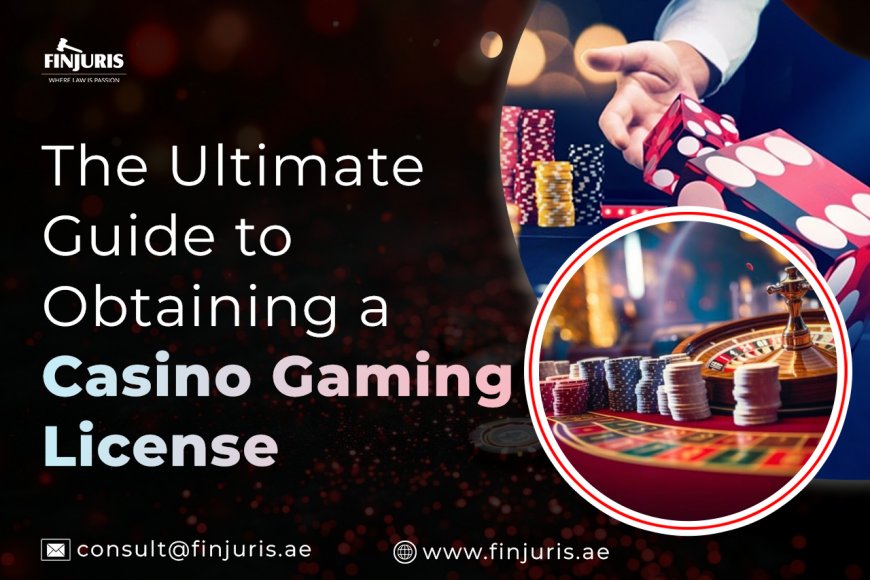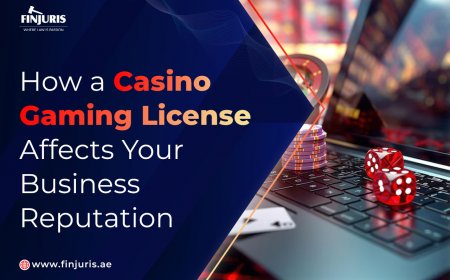The Ultimate Guide to Obtaining a Casino Gaming License
Learn how to get a casino gaming license with this ultimate guide—covering steps, costs, and legal tips for smooth approval.

A casino gaming license is a crucial legal requirement for any individual or company planning to operate a casino. Whether it’s a land-based establishment or an online gaming platform, acquiring the right license ensures compliance with gaming regulations, boosts credibility, and allows access to banking and payment processing services. This guide covers everything you need to know about obtaining a casino gaming license, including its importance, types, costs, and the application process.
What is a Casino Gaming License?
A casino gaming license is a regulatory approval granted by an official licensing authority that allows a business to operate a casino legally. It ensures that the casino complies with local and international gaming laws, protects players, and prevents illegal activities such as money laundering and fraud. Licensed casinos are subject to strict regulations, periodic audits, and compliance checks to maintain transparency and fairness.
Read more: Casino Gaming License: Everything You Need to Know in 2025
Why is a Casino Gaming License Important?
Obtaining a casino gaming license is essential for the following reasons:
- Legal Compliance: Operating a casino without a valid license is illegal and can lead to hefty fines, business closure, or legal action.
- Credibility & Trust: Licensed casinos attract more players as they are perceived as safe and fair.
- Payment Processing: Banks and payment gateways require casinos to have a valid license to process transactions.
- Game Providers & Partnerships: Most software developers and game providers work only with licensed casinos.
- Market Access: Licensing allows casinos to operate in multiple jurisdictions and expand their reach.
Read More: Commercial Gaming License: A Complete Guide for Operators in 2025
Types of Casino Gaming Licenses
The type of casino gaming license required depends on the nature of the casino business. Here are the main types:
- Land-Based Casino License: Required for physical casinos offering slot machines, table games, and other gambling activities.
- Online Casino License: Necessary for internet-based casino operators providing virtual games, live dealer games, and online slots.
- Sports Betting License: Covers betting services on sports events, esports, and other competitions.
- Lottery & Bingo License: For operators running lotteries, bingo games, and similar gambling activities.
- Poker Room License: Required for businesses hosting poker tournaments or offering poker as part of their casino services.
Read More: Navigating the Path to an Online Gaming License: A Key Step in Expanding Your Gaming Business
Top Casino Gaming License Jurisdictions
Several jurisdictions worldwide issue casino gaming licenses, each with different regulations and requirements. Some of the most reputable ones include:
Read More: How to Choose the Right Gaming License Jurisdiction for Your Business
Malta Gaming Authority (MGA)
- Pros: Highly respected, EU-approved, access to European markets
- Cons: Lengthy application process, higher fees
- Cost: Application fee (€5,000), Annual license fee (€25,000+), Compliance costs
United Kingdom Gambling Commission (UKGC)
- Pros: Strict regulations ensure credibility, access to UK markets
- Cons: High compliance requirements, expensive fees
- Cost: License fees range from £2,500 to £57,000+ depending on revenue
Curacao eGaming
- Pros: Affordable, fast approval process, covers multiple gaming activities
- Cons: Limited credibility compared to EU/UK licenses
- Cost: $15,000+ setup fee, annual fees around $10,000
Gibraltar Regulatory Authority
- Pros: Tax benefits, recognized by European markets
- Cons: High application standards, expensive
- Cost: Application fee (£30,000), Annual license fee (£100,000)
Isle of Man Gambling Supervision Commission
- Pros: Strong reputation, favorable tax conditions
- Cons: Complex regulatory requirements
- Cost: Application fee (£5,000), Annual fee (£35,000+)
Steps to Obtain a Casino Gaming License
The licensing process varies by jurisdiction, but generally includes the following steps:
Choose a Jurisdiction
Select a country that offers the best benefits for your casino. Consider factors like tax rates, application costs, and regulatory reputation.
Prepare a Business Plan
Regulatory authorities require a detailed business plan outlining your casino’s structure, operations, revenue model, and compliance measures.
Register a Business Entity
You must establish a legal company in the jurisdiction where you are applying for a license. Some countries require a local presence.
Gather Required Documents
Each jurisdiction has specific requirements, but common documents include:
- Company incorporation documents
- Directors’ identification and background checks
- Proof of financial stability (bank statements, audits)
- Responsible gambling policies
- Anti-money laundering (AML) compliance documents
Submit the Application
Once all documents are prepared, submit your application to the licensing authority along with the required fees.
Undergo Background Checks
Licensing authorities conduct extensive checks on the applicants, including criminal background and financial history.
Compliance & Technical Audit
Casinos must meet technical requirements, such as fair gaming certification, security protocols, and responsible gambling measures.
Receive License & Start Operations
If all requirements are met, the casino gaming license is granted, allowing the business to operate legally.
Cost of a Casino Gaming License
The cost of obtaining a casino gaming license varies by jurisdiction and includes:
- Application Fees: $2,000 - $50,000
- Annual License Fees: $10,000 - $100,000+
- Compliance & Audit Costs: $5,000 - $50,000
- Legal & Consultation Fees: Varies depending on complexity
Challenges in Obtaining a Casino Gaming License
While acquiring a casino gaming license provides many benefits, it also comes with challenges:
- Strict Regulations: Some jurisdictions have lengthy approval processes.
- High Costs: Licensing and compliance expenses can be substantial.
- Ongoing Compliance: Regular audits and reporting are required to maintain the license.
- Jurisdiction Limitations: Some licenses do not allow operation in specific countries.
Read More: Common Misconceptions about Online Gaming Licenses
Obtaining a casino gaming license is an essential step for any legal and successful casino business. While the process can be complex and costly, it ensures compliance, builds trust, and opens doors to global markets. Choosing the right jurisdiction, preparing proper documentation, and working with experts can make the licensing process smoother and more efficient. If you’re planning to launch a casino, start the licensing process today and ensure your business is legally protected and set up for long-term success!
What's Your Reaction?




















